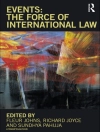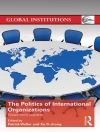When we speak of global governance today, we no longer mean simply state-to-state diplomacy, international treaties, or intergovernmental organizations like the United Nations. Alongside these ‘traditional’ elements of global politics are a host of new institutions ranging from global networks of governmental officials, to private codes of conduct for corporations, to action-oriented partnerships of NGOs, governments, corporations, and other actors. These innovative mechanisms offer intriguing solutions to pressing transnational challenges as diverse as climate change, financial governance, workers’ rights, and public health. But they also raise new questions about the effectiveness and legitimacy of transnational governance.
An expanding body of scholarship has sought to identify and assess these new forms of governance, but this young body of work has lacked a sense of the larger picture. This volume seeks to fill that need by presenting a comprehensive overview of new forms of transnational governance. This resource is essential for those who want to explain why transborder governance has changed and to understand what implications these changes have for global politics.
表中的内容
Notes on Contributors.
Preface.
1. Editors’ Introduction: Mapping Changes in Transnational Governance (Thomas N. Hale and David Held).
Transgovernmental Networks.
Introduction.
2. Basel Committee on Banking Supervision (Kevin Young).
3. Financial Action Task Force (Ian Roberge).
4. Financial Stability Board (Randall Germain).
5. Group of Twenty (Jon Kirton).
6. Global Forum on Transparency and Exchange of Information (Tony Porter and Veronica Rubio Vega).
7. International Accounting Standards Board (Andreas Nölke).
8. International Association of Insurance Supervisors (Donato Masciandaro).
9. International Competition Network (Marie-Laure Djelic).
10. International Conference on Harmonization of Technical Requirements for the Registration of Pharmaceutical Products (Dimitris Katsikas).
11. International Network for Environmental Compliance and Enforcement (Durwood Zaelke, Kenneth Markowitz, and Meredith R. Koparova).
12. Joint Forum (Kevin Young).
13. Transnational Policing (Monica den Boer).
Arbitration bodies.
Introduction.
14. Citizen Submission Process of the North American Commission on Environmental Cooperation (Thomas Hale).
15. Independent Accountability Mechanisms at Regional Development Banks (Danny Bradlow and Andria Naude Fourie).
16. Transnational Commercial Arbitration (Dirk Lehmkuhl).
17. World Bank Inspection Panel (Thomas Hale).
Multistakeholder initiatives.
Introduction.
18. Framework Convention Alliance (Ross Mac Kenzie).
19. Global Fund to Fight AIDS, Tuberculosis, and Malaria (Johanna Hanefeld).
20. Global Polio Eradication Initiative (Mathias Koenig-Archibugi).
21. Internet Corporation for Assigned Names and Numbers (Jonathan Koppell).
22. International Coral Reef Initiative (Radoslav Dimitrov).
23. International Health Partnership and IHP+ (Anna Holzscheiter).
24. Multistakeholder Involvement in UN Conferences (Kathrin Böhling).
25. World Commission on Dams (Navroz Dubash).
Voluntary Regulations.
Introduction.
26. Carbon Disclosure Project (Eun-Hee Kim and Thomas P. Lyon).
27. Codex Alimentarius (Tim Büthe and Nathaniel Harris).
28. Equator Principles (Christopher Wright).
29. Extractive Industries Transparency Initiative (Helmut Weidner).
30. Fair Labor Association (Kate Mac Donald).
31. Fair Trade (Kate Mac Donald).
32. Clean Clothes Campaign (Niklas Egels-Zanden).
33. Forest Stewardship Council (Philipp Pattberg).
34. Global Corporate Governance Principles (Andrew Baker).
35. Global Reporting Initiative (Halina Szejnwald Brown).
36. International Standards Organization (Jonathan Koppell).
37. International Standards Organization 14001 (Matthew Potoski and Elizabeth Elwakeil).
38. Kimberly Process (Carola Kantz).
39. Marine Stewardship Council (Thomas Hale).
40. OECD Guidelines for Multinational Enterprises (Elisa Morgera).
41. Partnering against Corruption Initiative and the Business Principles for Countering Bribery (David Hess).
42. Responsible Care (Ivan Montiel).
43. Rugmark (Mathias Koenig-Archibugi).
44. Social Accountability International (Rainer Braun).
45. International Council of Toy Industries Code of Conduct (Reinhard Biedermann).
46. United Nations Global Compact (Thomas Hale).
47. Voluntary Principles on Security and Human Rights (Chip Pitts).
48. Worker Rights Consortium (Robert J.S. Ross).
Finance Mechanisms.
Introduction.
49. Carbon Offsets (Jessica F. Green).
50. Financing mechanisms for climate change mitigation (Charlotte Streck).
51. Global Alliance for Vaccines and Immunisations (Andrew Harmer and Carlos Bruen).
52. UNITAID (Anna Holzscheiter).
关于作者
Thomas Hale is a Ph D candidate at Princeton University.
David Held, is Graham Wallas Professor of Political Science at the London School of Economics and Political Science.












